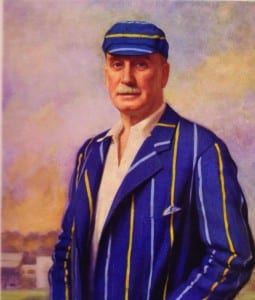Lord Martin Bladen Hawke
Clubs: Yorkshire CCC, England
Roles and Representation: Yorkshire captain 1883-1910, Yorkshire CCC President 1898-1938, MCC President 1914-1919, England selector 1899-1909
Honours: Wisden Cricketer of the Year 1909
One of English cricket’s most famous figures, it might be thought that Lord Martin Bladen Hawke – the face of Yorkshire cricket for several decades in the late 19th and early 20th centuries – does not obviously belong in a Lincolnshire Hall of Fame. Nonetheless, belong he does: he was born in the Willingham village rectory, near Gainsborough, by virtue of the fact that his father – the Reverend Edward Henry Julius Hawke – was ministering there at the time of Martin’s birth in 1860.
By the time Hawke was 14, his father had inherited his title from a cousin and resigned his living as a rector; Hawke was sent to Eton and from there went to Cambridge, where he played cricket for the university. He first represented Yorkshire in 1881, against the MCC at the Scarborough Festival, and two years later he took over the captaincy of the county. In fact, up until 1991 when Yorkshire’s strict rule about only those born within its borders being able to represent the county was relaxed, he was the only non-Yorkshireman ever to have played for their first team.
Between 1893 and 1908, Hawke led Yorkshire to win the county championship 8 times, making him the most successful captain in the history of county cricket. He represented England on 9 overseas tours between 1887 and 1912, leading teams in Australia, India, North America, South Africa, West Indies and Argentina. On four occasions he also captained his country, all four times to victory. He was Wisden’s Cricketer of the Year in 1909, described by the editor as “an absolute master [who] has always used his power wisely”.
Hawke was elected Yorkshire CCC President in 1898 and held the post until his death. After his retirement in 1910 he became heavily involved in the MCC, appointed its president in 1914. His years as an administrator were not without controversy, typified by his famous statement: “Pray God, no professional shall ever captain England.”
Having succeeded his father as 7th Baron Hawke of Towton in 1887, Hawke married in 1916 and lived with his wife in North Berwick until his death in 1938, aged 78. His obituary in Wisden describes him as “a great cricketer in the highest sense of the word [and] an administrator who not only aimed at the general welfare of the game, but sought to preserve in it an untarnished ethical code.”


